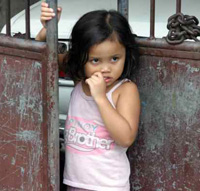Philippine Culture: Hiya
 The core value of Philippine society is “hiya” (Tagalog, in Bisaya: ulaw), which controls the social and individual behavior of Filipinos. Hiya is a feeling of failure and triggers from deep inside shame and disgrace, when Filipinos realize that they have violated the rules of conduct and expectations of society. This since ancient times instilled sense has made most of Filipinos shy and reticent people. So most Filipinos are afraid to talk frankly about a problem, concern or request. Hiya is also a means of coercion, educating with force the already small children in certain social norms of behavior. It characterizes the relationships between the Filipinos and decisively expressed in many small, but typical Filipino behavior. It is unseemly for example, to express outspoken criticism of a person or group, and they always express it indirectly with soothing phrases.
The core value of Philippine society is “hiya” (Tagalog, in Bisaya: ulaw), which controls the social and individual behavior of Filipinos. Hiya is a feeling of failure and triggers from deep inside shame and disgrace, when Filipinos realize that they have violated the rules of conduct and expectations of society. This since ancient times instilled sense has made most of Filipinos shy and reticent people. So most Filipinos are afraid to talk frankly about a problem, concern or request. Hiya is also a means of coercion, educating with force the already small children in certain social norms of behavior. It characterizes the relationships between the Filipinos and decisively expressed in many small, but typical Filipino behavior. It is unseemly for example, to express outspoken criticism of a person or group, and they always express it indirectly with soothing phrases.
Understanding Hiya makes it possible for foreigners to understand certain behaviors of the Filipino people better, but always leads to difficult situations and unpleasant impressions by the foreigner. Let us compare Western ways of thinking with those of Filipinos:
| Western way of thinking | Filipino way of thinking |
| People are equal. | A class system (hierarchy) |
| In the Western way we think that no matter how poor or rich a person, we are equal when it comes right down to it. | For Filipinos generally the person with the most wealth is “more equal” than the poor person. |
| Horizontal outlook of people (equality) | Vertical outlook of people (hierarchy) |
| Filipinos often say, “He is higher than you” or “You’re higher than her.” And typically, a foreigner is always easy at the top or near the top position only because it’s a foreigner. It does not matter that one don’t know the foreigner and its personal background. | |
| Strong sense of “right” and “wrong” | Shame is a master control system |
| In foreigner thinking, a person can be good at one time, and bad at another, it depends if he does the right thing or the wrong thing in each instance. | Under Filipino thinking, if the person is high on the totem pole, if he does something wrong, it may be ignored, simply to not embarrass him. It would be shameful to say that he has done wrong. |
| Good or bad | What will people say? |
| Many foreigner don’t really care much what other people think, as long as they feel that they are doing the right thing for themselves and their families, what others think doesn’t really play a role in their thinking. | What others will think is of the utmost importance to a Filipino. |
As you can see, Filipinos are very concerned with what other people think. If you do something that casts a bad light on the Filipino, it causes them to lose face because it shows other people that they have done something bad. If they do something bad, but nobody notices, it is as if nothing bad was done at all. But, calling them out on it can cause you serious problems, because it basically brings down the stock of the Filipino to others who are watching. You don’t want to do that.
Tags: Philippines

